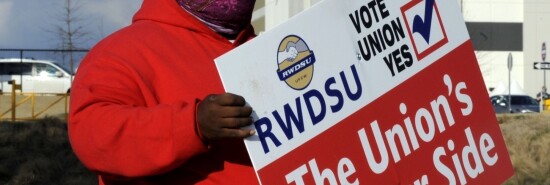
Workers have almost no say over what union bosses do — even their votes don’t count
Mark Mix
Video Embed
Back in the late 1970s, then-Teamsters czar Frank Fitzsimmons, a one-time protege of Jimmy Hoffa who took over the union after Hoffa was imprisoned, provoked laughter when he referred to the mob-infested outfit he headed as “the most democratic institution God ever put on this earth.”
Fitzsimmons was, of course, lying. But he wasn’t really fooling anyone. Unfortunately, when 21st-century Big Labor apologists and union bosses claim, a la Fitzsimmons, that “workers are the union” or workers “vote to accept or reject” union contracts with their company, they tend to get taken much more seriously. They shouldn’t be. The fact is, under federal labor law, union bosses can and often do ratify union contracts without any rank-and-file vote at all, without giving workers a meaningful chance to review the contract before the vote, or even after a majority of workers casting ballots have voted “no.”
MEN NEED TO BE WORKING — AND FEWER AND FEWER OF THEM ARE
The emptiness of “workers are the union” claims is being exposed in a National Labor Relations Board case that will decide the fate of roughly 60 employees of Latrobe Specialty Metals holding jobs at the company’s steelworks plant in western Pennsylvania.
On Aug. 1, employee Kerry Hunsberger, after receiving legal advice and assistance from a National Right to Work Legal Defense Foundation staff attorney, submitted a petition to the NLRB signed by her and 23 of her fellow employees. The petition sought an NLRB-held vote among workers on whether to remove United Steelworkers union officials who currently enjoy monopoly power to bargain with the company over employees’ pay, benefits, and work rules.
If a majority of the employees casting ballots in a decertification election vote “yes,” the union will be stripped of its monopoly-bargaining privileges, and employees will be free to deal directly with the employer.
Unfortunately, as a practical matter, federal law prohibits unionized workers who are dissatisfied with how an “exclusive union bargaining agent” is handling their careers from decertifying it except for a small fraction of the time. For example, under the so-called “contract bar,” once a multiyear union contract is ratified, decertification efforts are forbidden for up to three years, except during a 30-day window beginning 90 days before the contract expires.
But when Hunsberger and other Latrobe Specialty Metals employees who believe USWA bosses are doing a poor job acted this summer, just over two years after the union had been certified at the facility, no union contract was in effect. In fact, on July 25, less than a week before the decertification petition was submitted, the employees had voted down by a wide margin a contract negotiated by union officials and company representatives.
At the time of this vote, as even USWA union lawyer Nathan Kilbert does not contest, workers were told that the proposed contract would be “activated” only if a majority voted in favor of it. However, shortly after the vote, the union brass became cognizant of the fact that a decertification drive was underway and that it might well succeed. And so union lead negotiator Daniel Nunzir surreptitiously “executed” the proposed contract.
Finally, on the evening of Aug. 1, after the employees had voted against the contract for the second time in a vote called by the union, Nunzir sent an email to the company declaring that the contract had been “ratified” and was now in effect despite employees’ having rejected it twice.
Because the secret contract ratification allegedly occurred on July 28, before the decertification petitions were submitted, USWA officials claim the “contract bar” now prohibits an employee decertification vote. In an NLRB brief submitted on Sept. 16, Kilbert insists there is nothing unusual about what the union is doing:
The Union can and does enter into contracts without a member ratification vote. … Whether or not a contract takes effect is not contingent on employees voting to approve a contract. … There is no obstacle to the Union accepting a contract after an employee vote disapproving it.
Fortunately for Latrobe Specialty Metals employees, this was a sloppily executed scheme. Just for starters, the “ratified” contract has no discernible effective date. Because of USWA bosses’ careless haste, employees just may, with National Right to Work Legal Defense Foundation attorneys’ help, get their decertification vote after all and avoid being forced to pay union dues as a job condition, as the putative contract requires. But the above-quoted union lawyer’s summary of how U.S. labor policy works is, sadly, 100% correct. Union bosses and their apologists should stop pretending otherwise.
CLICK HERE TO READ MORE FROM THE WASHINGTON EXAMINER
Mark Mix is president of the National Right to Work Legal Defense Foundation.
